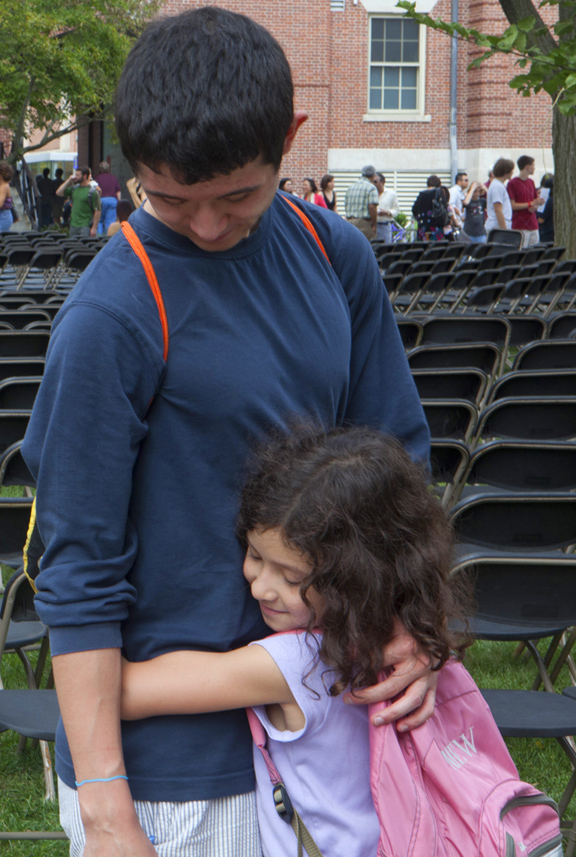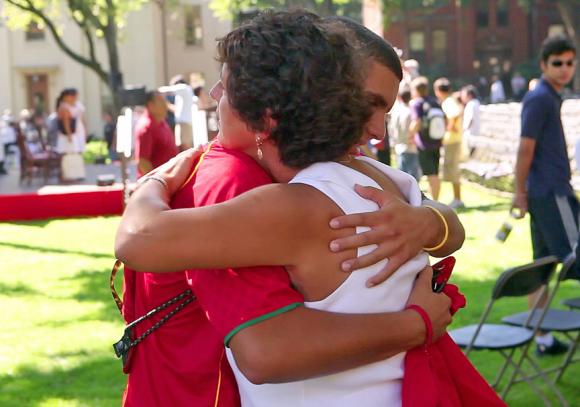For Parents:
What might parents do to make this a positive experience for themselves and their student?
It’s important to remember that it is an exciting time for your student. While your life at home may become quieter with their absence, students’ lives here are about to become a lot fuller, especially during the orientation period when they are very busy with activities, meeting people and adjusting to college life. So you may not hear from them right away or they might communicate less often than you would like. One of the best things parents can do is to be flexible about their expectations about how often and when their student shares the details of his or her new life.

It also will help to recognize that there is a wide range of emotions students and parents may feel on this day: anxiety, sadness, a sense of being overwhelmed, joy — are all normal and part of the process.
For Parents:
What is the single most important thing a parent should do at this time to benefit their student?
Send the message that you know that this will be an exciting time for your student and that you have confidence that he or she will ably handle the challenges that come with being a college student and with being away from home.
For Parents:
What should parents do to help make this transition go smoothly?
- Do text: One of the first things I’d suggest parents do is that if they don’t know how to text or don’t usually text, now might be a good time to begin because it is a way a lot of students like to communicate. It is also a way to do a quick check-in, which new students may be more likely to do than having a longer conversation.
- Do ask for what you need: If your student is not a great communicator, you could establish a time with your son or daughter to have a brief conversation, whether it is during the Orientation Program or some other time in the first week or so. Let them know that it can be brief but that you want to hear how they are doing. Even having a one-line response of “things are going fine,” can be useful and is OK to expect, but I caution parents not to put too much pressure on their student to communicate more than usual. It helps if students know their parents respect their independence and can tolerate not hearing from them every day.
- Do reassure: Do let your student know that you will be fine and they will be fine. It’s OK to say, “I will miss you,” but it’s important to communicate that you will be fine without them. While showing sadness is natural and expected, parents might want to manage stronger emotions later on their way home, for the benefit of their student.
- Do listen to your child’s cues: Some students will want their parents to drop them off and leave right away, while others may want something more. As time goes on, their needs to communicate with home during these first couple of months will change as they acclimate to their lives here. They might communicate with you a lot right now and less as time goes on.
For Parents:
What should parents avoid on this important day?
- Don’t linger: Don’t linger at the moment of the goodbye; it doesn’t really help.
- Don’t panic: If it seems to be a rocky start for your student, don’t panic. You want to give them support but you also want them to know that you have confidence in them that they will do OK, and that they will be able to figure out how to deal with the inevitable challenges that will come up.
- Don’t bring up “hot button” issues: This is not the time to bring up areas of contention with your student. It will help everyone if you keep things on a positive note.
There are a lot of resources available to students from residential peer counselors to deans to their peers to Psychological Services. Many resources are available to parents, as well. If parents are particularly worried or have concerns, they can, for example, contact a dean in the Office of Student Life or a staff member in Psychological Services. Brown has a very deep safety net for students.
For students:
What kind of advice would you offer to students to navigate this day well?

It is possible to take your parents’ wishes into account and establish your independence at the same time. You may want them to simply drop you off at the curb, but they might want to stay and say some sort of goodbye. It’s part of the maturing process to be aware of your parents’ needs for connection with you. It may take them some time to adjust to your absence.
But for students, as for their parents, it’s important to recognize that your parents will be okay so you can focus on your new life at Brown. And if you can communicate to your parents in a positive way that you are ready to get started on your college journey, chances are they will feel more ready to start their journey home.

